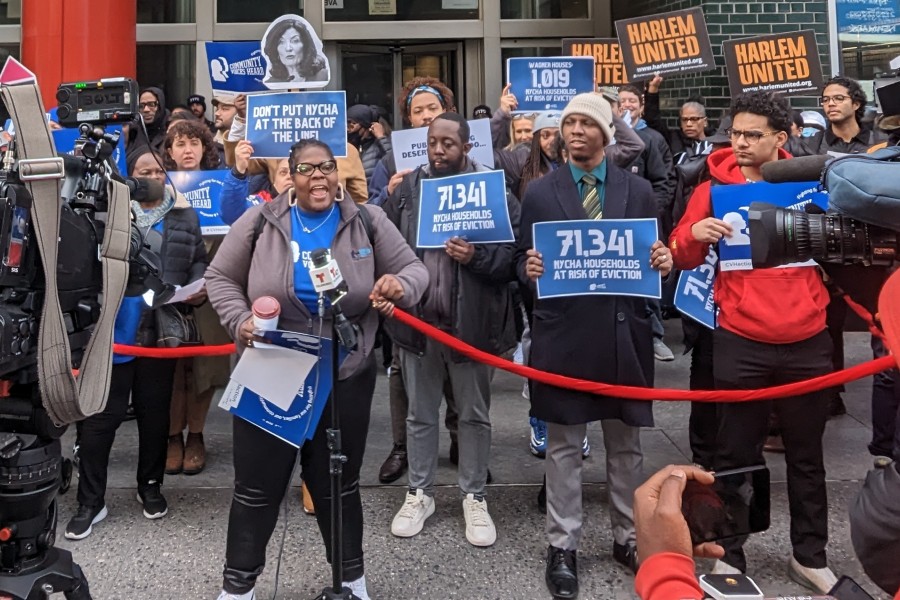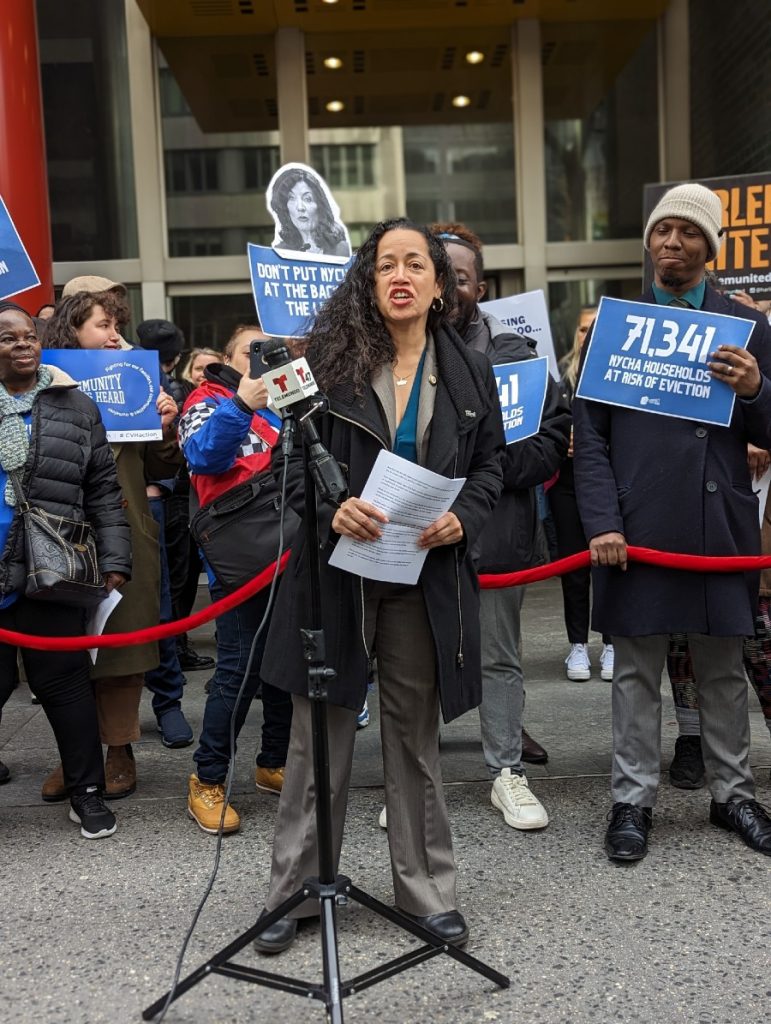
This morning, public housing residents, community organizations, and City leaders rallied for public housing rent relief outside of Governor Hochul’s Manhattan office.
New York State put NYCHA tenants at the back of the line for COVID rent relief. New York was the only state to ignore public housing in its Emergency Rental Assistance Program (ERAP); other states prioritized those most impacted by the pandemic, according to a report by the Community Service Society. Indeed, both Massachusetts and Maryland’s programs prioritized public housing tenants.
As a result, there are 71,341 NYCHA households at risk of eviction. Households in New York State have a total of $589.4 million in rental arrears, most of which accrued during the pandemic.
“My community went through so much during the pandemic,” said Community Voices Heard member Barbara Williams, a NYCHA tenant in Harlem. “I help with a neighborhood food pantry, and when the pandemic began, the number of families showing up almost tripled. People couldn’t afford to feed their families. People lost jobs and couldn’t pay their rent. It is unfair that all the other renters in the State got COVID rental assistance, while residents in public housing and Section 8 were put at the back of the line. There are 791 households in my development – alone – that owe back rent and are facing eviction. These families and their children are depending on our elected officials to come through.”
“New York was the only state to put subsidized housing residents at the back of the line for rental assistance, and it’s time we make this right,” said Council Member Alexa Avilés. “For too long, New York State has not paid its share to support the lowest-income tenants who call public housing across the state home. The $538 million for NYCHA and the $51 million we are demanding for upstate housing authorities is just the floor for what the state should be investing in public housing. If we are serious about addressing the housing crisis today, we have to recognize public housing as part of the solution and match our words with dollars.”
“Once again, NYCHA and public housing residents across the state have been put at the back of the line,” said Community Voices Heard Executive Director Juanita O. Lewis. “When the pandemic hit, public housing residents were hit hard. Many people lost their jobs and could no longer make ends meet. People fell behind on their rent. New York State’s Emergency Rental Assistance Program had almost $3 Billion dollars to help people pay back rent. But the Governor’s Office gave out all of the money, and there is nothing left for public housing residents. No other state in the U.S. did this; New York was alone in deciding that public housing residents were less important than other renters. The Governor, the Senate Majority Leader, and the Speaker must right this wrong.”
“New York’s decision to leave public housing residents out of the Federal Rental Assistance Program has shocked many across the nation and created a confusion for many tenants who would have been otherwise eligible,” said Iziah Thompson, Senior Policy Analyst at the Community Service Society (CSS). “It is not enough to simply close and fund the emergency rental assistance portal. Accountability for this error, means covering all the arrears in public housing, most of which accrued during and after the pandemic.”
While tens of thousands of households applied to the Emergency Rental Assistance Program (ERAP), the authorizing legislation de-prioritized public housing tenants. Tenants and City leaders called on the State to enact a statewide emergency rental assistance program for public housing residents, providing $538 million for rental arrears at NYCHA and $51 million for Public Housing Authorities in Western New York, upstate, and Long Island.
Despite over 70,000 public housing households at risk of eviction, the Governor’s Executive Budget plan included no funding to cover these arrears. The Assembly and Senate One House Budgets included on $385 million and $389 million, respectively, which only allow for coverage of applications to the State’s ERAP program prior to the January 20th cutoff date – meaning only a fraction of NYCHA tenant arrears can be covered, and tens of millions less than what is needed in upstate, Western, and Long Island Public Housing Authorities. These plans leave out thousands of households that were eligible but didn’t apply for various reasons, including confusion about their eligibility because of the State legislature’s language.
State lawmakers created rental assistance programs for tenants in private buildings; they can do the same for public housing residents in the FY 2023-24 budget. Governor Hochul and the State Legislature must stop putting NYCHA tenants at the back of the line.
Community Voices Heard (CVH) is a member-led, multi-racial organization principally comprised of women of color and low-income families in New York State. CVH tackles tough issues and builds power to secure racial, social, and economic justice for all New Yorkers. Through grassroots organizing, leadership development, policy changes, and creating new models of direct democracy CVH is creating a truly equitable New York State.


Photo credit: 1) Juanita Lewis. 2) Alexa Avilés, District 38 Council Member. 3) Barbara Williams, CVH Member, NYCHA Harlem Tenant.
Become a Harlem Insider!
By submitting this form, you are consenting to receive marketing emails from: Harlem World Magazine, 2521 1/2 west 42nd street, Los Angeles, CA, 90008, https://www.harlemworldmagazine.com. You can revoke your consent to receive emails at any time by using the SafeUnsubscribe® link, found at the bottom of every email. Emails are serviced by Constant Contact








